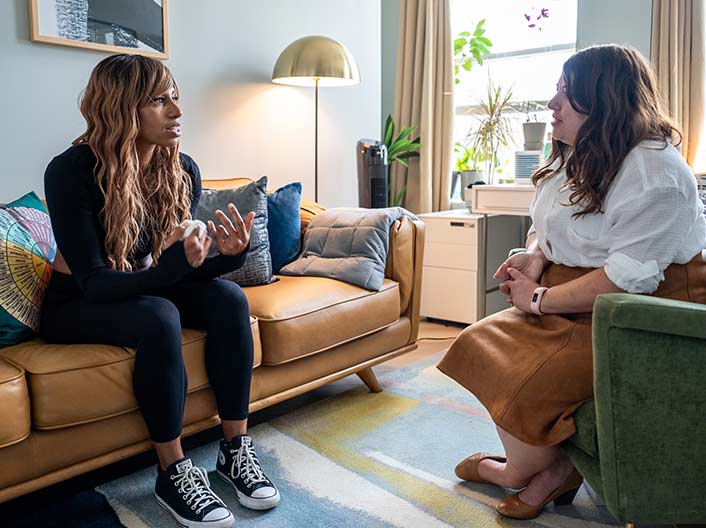Family Therapy
- Home
- Family Therapy
FAMILY THERAPY FOR ADULTS (18+)
Repair communication, heal old patterns, and build a calmer, more connected adult family system.
UNDERSTANDING ADULT FAMILY DYNAMICS
 Adult families can get stuck in criticism/defensiveness, cutoff, or caretaking burnout. Therapy maps the cycle, updates roles and boundaries, and practices repair to reduce reactivity and resentment.
Adult families can get stuck in criticism/defensiveness, cutoff, or caretaking burnout. Therapy maps the cycle, updates roles and boundaries, and practices repair to reduce reactivity and resentment.
PSYCHOEDUCATION
- Attachment & Differentiation: stay connected while honoring differences.
- Intergenerational Patterns: name themes; keep what works, update what doesn’t.
- Nervous-System Lens: co-regulation tools prevent escalations and shutdowns.
THERAPY OPTIONS AT ASTUTE

- EFT-Informed Family Work
- Slow the cycle; express core needs; rebuild safety.
- Gottman & Communication Skills
- Conflict rules, repair scripts, boundaries, and requests.
- Grief/Transition Support
- Navigate loss, caregiving, moves, or identity changes.
- Holistic Supports
- Yoga therapy, somatic movement, and sound bath to down-regulate.
COORDINATED SUPPORT

- Collaboration with medical/psychiatric care when helpful
- Referrals for legal/estate planning or community supports
- Couples or individual therapy add-ons when indicated
WHAT TO EXPECT
- Mapping: clarify patterns and goals.
- Stabilization: ground rules, time-outs, and repair steps.
- Practice: new scripts, boundaries, and problem-solving.
- Maintenance: rituals of connection and relapse prevention.
WHY CHOOSE ASTUTE
- Evidence-based, inclusive, and practical
- Calm, structured sessions with take-home tools
- In-person and telehealth options
SUGGESTED HOLISTIC SUPPORTS
- Breathwork for co-regulation
- Somatic movement for tension patterns
- Sound bath/Reiki for deep rest
IN CRISIS?
If you are in crisis, please contact your nearest ER immediately.National Suicide & Crisis Lifeline: 988 • Text: HOME to 741741
Family therapy can help you improve troubled relationships with your partner, children or other family members. You may address specific issues such as marital or financial problems, conflict between parents and children, or the impact of substance abuse or a mental illness on the entire family.
Your family may pursue family therapy along with other types of mental health treatment, especially if one of you has a mental illness or addiction that also requires additional therapy or rehabilitation treatment. For example:
Family therapy can help family members cope if a relative has a serious mental illness such as depression — but the person who has depression should continue with his or her individualized treatment plan, which may include medications, one-on-one therapy or other treatment.
In the case of addiction, the family can attend family therapy while the person who has an addiction participates in residential treatment. Sometimes the family may participate in family therapy even if the person with an addiction hasn’t sought out his or her own treatment.
Family therapy can be useful in any family situation that causes stress, grief, anger or conflict. It can help you and your family members understand one another better and learn coping skills to bring you closer together.
Family therapy typically brings several family members together for therapy sessions. However, a family member may also see a family therapist individually.
Sessions typically take about 50 minutes to an hour. Family therapy is often short term — generally about 12 sessions. However, how often you meet and the number of sessions you’ll need will depend on your family’s particular situation and the therapist’s recommendation.
During family therapy, you can:
Examine your family’s ability to solve problems and express thoughts and emotions in a productive manner
Explore family roles, rules and behavior patterns to identify issues that contribute to conflict — and ways to work through these issues
Identify your family’s strengths, such as caring for one another, and weaknesses, such as difficulty confiding in one another
EXAMPLE: DEPRESSION
Say that your adult son has depression. Your family doesn’t understand his depression or how best to offer support. Although you’re worried about your son’s well-being, conversations with your son or other family members erupt into arguments and you feel frustrated and angry. Communication diminishes, decisions go unmade, family members avoid each other and the rift grows wider.
In such a situation, family therapy can help you:
Pinpoint your specific challenges and how your family is handling them
Learn new ways to interact and overcome unhealthy patterns of relating to each other
Set individual and family goals and
work on ways to achieve them
Results
Family therapy doesn’t automatically solve family conflicts or make an unpleasant situation go away. But it can help you and your family members understand one another better, and it can provide skills to cope with challenging situations in a more effective way. It may also help the family achieve a sense of togetherness.